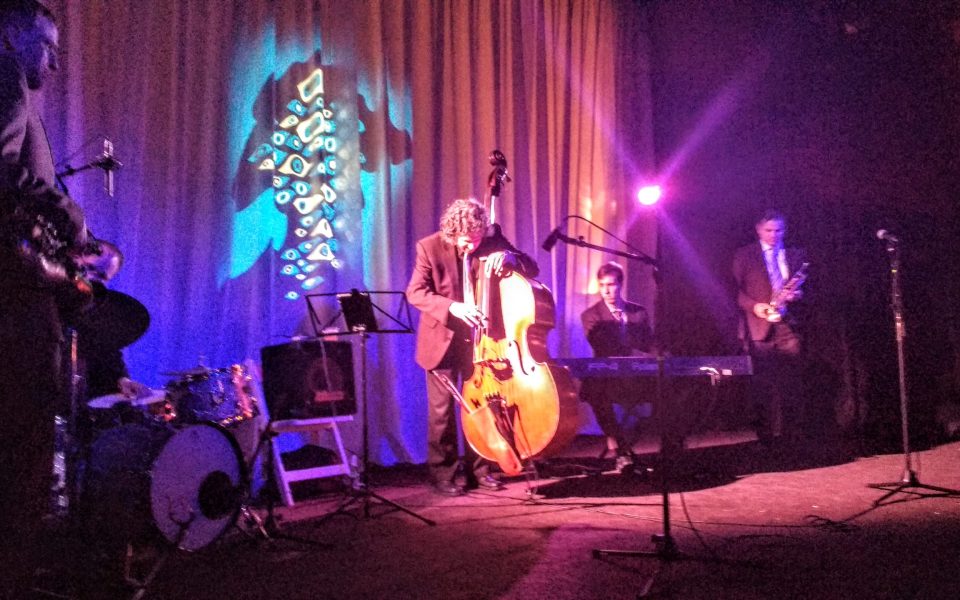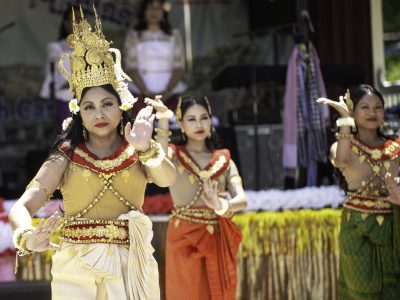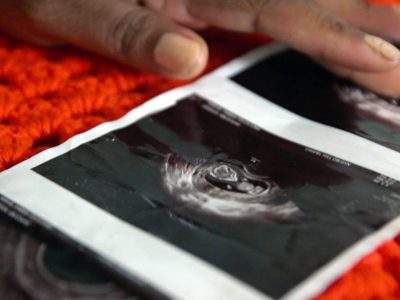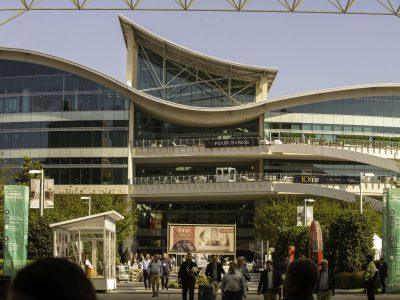by Joanna Rutter
Eddie Schmit was tucked away behind a cocktail table, easily lost in the sea of several hundred people milling in low light were it not for his bright blue filmmaker’s badge. He looked content enough standing alone, people-watching, but like other filmmakers at the RiverRun opening gala, he didn’t mind being approached by a stranger.
“My date stood me up,” he said jokingly. “Of course you can talk to me.”
The Charlotte native and Elon University grad was visiting Winston-Salem this week to screen his debut short film, Swimlapse, a story about a teenage lifeguard based on his personal experiences. The short was shot at the YMCA pool he used to guard, he said, and that coming back to North Carolina from New York City has been a nice return to roots, just like the film itself.
“It’s a homecoming story,” he said.
And that’s RiverRun International Film Festival, in essence, as gleaned from the gala at the Millennium Center on April 8: filmmakers like Schmit rubbing elbows with festivalgoers, sharing in a passion for a story well told.
The “international” part of the festival’s title wasn’t placed there for decoration, after all. Hao Shen, director of the short film The Last Show, possibly had the longest journey to RiverRun: He traveled more than 15 hours by plane from Shanghai for the world premiere of his work.
Tragically, Juliette Binoche, star of L’Attesa, one of the other intriguing international films at the festival, was nowhere to be seen (quelle tristesse). But Helen Simoneau, a French-speaking culturati of the local dance scene, was making her rounds at the party. As she surveyed the room, though, she confessed that thoughts of her upcoming collaborative dance event with Must Be the Holy Ghost for next weekend’s Phuzz Phest, to be held in the same space as the gala, were distracting her from the festival at hand.
Local arts power couple John Oksanish and Devon Mackay — a Wake Forest classical languages professor and a development director for the Arts Council of Winston-Salem & Forsyth County respectively — speculated on the most talked-about films on the lineup this year, naming the already sold-out closing film Love & Friendship, an Austenian comedy starring Chloe Sevigny and Kate Beckinsale, and the documentary Tower.
Another film mentioned on many attendees’ short lists was Driving While Black, a “dark comedy deeply rooted in reality.” At the gala, Dominique Purdy, who co-wrote and stars in the film, said the story is based on his life experiences in LA.
“It’s all real,” he said, mentioning one of the locations in the film. “I’m going back to that pizza place on Monday.”
The theme for the evening was well executed, albeit a tad of a poor choice, historically speaking. Instructions were given to dress à la “Cotton Club,” invoking the name of a famous whites-only Prohibition nightclub. But a diverse smattering of gala attendees who had followed the dress code made the flapper frocks and seersucker suits of the era look timelessly good.
It would be a crime to not call attention to the best-dressed guest: Paul Sapiano, director of Driving While Black, stood out from the evening’s ocean of dark hues in a deep magenta silk two-piece suit and leather coat.
Elegant jazz music provided by the Camel City Jazz Orchestra gave the gala a classy start. Later in the evening when the band left the stage, however, musical offerings took a turn. The consensus between two polled bartenders was that whoever was DJ-ing had hand-picked selections from the most unfortunate pop music of the mid-2000s, including some third-tier singles from Rihanna and Katy Perry, played at gradually louder volumes disproportionate to the crowd’s interest.
A poorly timed Taylor Swift song — the completely undanceable “Wildest Dreams” — shortly followed by the mood-muffling “Apologize” by Timbaland, killed any possibility of the dance floor getting invigorated before midnight.
Not that the invigorating would have been well received anyway, given the real-life cinema taking place directly outside.
TCB sportswriter Anthony Harrison and Simoneau, who were outside at the time of the incident, saw a Ford Explorer flip twice at the intersection of West Fifth and Trade streets after swerving to avoid a Toyota Corolla that ran a red light shortly before midnight.
Police and EMTs arrived at the scene within minutes; the drivers were transferred to stretchers and taken away via ambulance.
As the early turn-in crowd began to spill out of the Millennium Center en masse, some to ogle at the flipped car and flashing emergency lights, a lone festival volunteer stood firmly on the red carpet to secure it from slipping so that attendees wouldn’t accidentally surf down the stairs.
The rumpled red carpet, leading from the glowing glamour of the Millennium Center into the windy, chilly chaos and drizzling rain that was downtown Winston-Salem that night, seemed to serve as a metaphor for the RiverRun Festival itself: a haven for indie filmmakers and fans in a city scrappy enough to welcome them without much pretense.
Join the First Amendment Society, a membership that goes directly to funding TCB‘s newsroom.
We believe that reporting can save the world.
The TCB First Amendment Society recognizes the vital role of a free, unfettered press with a bundling of local experiences designed to build community, and unique engagements with our newsroom that will help you understand, and shape, local journalism’s critical role in uplifting the people in our cities.
All revenue goes directly into the newsroom as reporters’ salaries and freelance commissions.





Leave a Reply